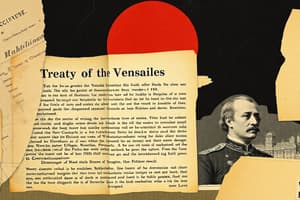Podcast
Questions and Answers
What techniques did the Nazis use in propaganda to gain the support of the German populace?
What techniques did the Nazis use in propaganda to gain the support of the German populace?
The Nazis used charismatic leadership, promises of economic recovery, and the promotion of a common enemy to unify different social classes.
How did the Great Depression impact the German economy and contribute to the Nazis' rise to power?
How did the Great Depression impact the German economy and contribute to the Nazis' rise to power?
The Great Depression led to high unemployment and severe economic distress, making people desperate for change and more receptive to the Nazis' promises of recovery.
What aspects of political instability in the Weimar Republic facilitated Hitler's ascent to power?
What aspects of political instability in the Weimar Republic facilitated Hitler's ascent to power?
The Weimar Republic faced numerous parties with no clear majority, ongoing political infighting, and a lack of widespread support for democracy.
What social challenges did Germany face in the post-WWI era that contributed to the rise of extremist political movements?
What social challenges did Germany face in the post-WWI era that contributed to the rise of extremist political movements?
What were the consequences of the Treaty of Versailles that affected the political climate in Germany post-WWI?
What were the consequences of the Treaty of Versailles that affected the political climate in Germany post-WWI?
What were some techniques used by Nazis in their propaganda to influence public opinion during their rise to power?
What were some techniques used by Nazis in their propaganda to influence public opinion during their rise to power?
How did the Great Depression economically impact Germany and its recovery efforts?
How did the Great Depression economically impact Germany and its recovery efforts?
What factors contributed to the political instability of the Weimar Republic?
What factors contributed to the political instability of the Weimar Republic?
What social challenges did Germany face in the aftermath of World War I?
What social challenges did Germany face in the aftermath of World War I?
In what ways did the Treaty of Versailles impact German society and politics after WWI?
In what ways did the Treaty of Versailles impact German society and politics after WWI?
How did hyperinflation in the early 1920s affect the everyday lives of average Germans?
How did hyperinflation in the early 1920s affect the everyday lives of average Germans?
What role did political violence play in shaping the Weimar Republic's history?
What role did political violence play in shaping the Weimar Republic's history?
What were the long-term consequences of the Weimar Republic signing the Treaty of Versailles?
What were the long-term consequences of the Weimar Republic signing the Treaty of Versailles?
What role did propaganda play in the Nazi state?
What role did propaganda play in the Nazi state?
How did the Great Depression economically impact Germany?
How did the Great Depression economically impact Germany?
What were some political instabilities of the Weimar Republic?
What were some political instabilities of the Weimar Republic?
What social challenges did Germany face in the post-WWI era?
What social challenges did Germany face in the post-WWI era?
What were the main consequences of the Treaty of Versailles on Germany?
What were the main consequences of the Treaty of Versailles on Germany?
How did the Nazis seek to influence German youth?
How did the Nazis seek to influence German youth?
What was the Nazi slogan regarding women's roles, and what did it signify?
What was the Nazi slogan regarding women's roles, and what did it signify?
What happened at the Wannsee Conference in January 1942?
What happened at the Wannsee Conference in January 1942?
Flashcards are hidden until you start studying
Study Notes
Germany After WWI
- Germany faced significant economic and social challenges after WWI due to the Treaty of Versailles.
- Reparations payments imposed on Germany totaled $60 billion, a staggering amount that significantly crippled their economy.
- Germany printed money to pay reparations, which led to hyperinflation and made the currency almost worthless.
- The loss of land and resources caused by the treaty limited their capacity to recover economically.
- The loss of territory also limited their capacity for international trade.
Weimar Republic
- The Weimar Republic was a period of democracy in Germany, established after WWI.
- The political landscape of the Weimar Republic was characterized by extreme political instability.
- The Reichstag (German Parliament) held numerous parties with no clear majority resulting in weak and fragile governments.
- The Weimar Republic was unpopular amongst many Germans who believed it had betrayed the country by signing the Treaty of Versailles.
- The government was also criticized for its handling of the economic crisis and hyperinflation.
- The Weimar Republic faced numerous threats from both the left and right, including socialist uprisings and extremist movements.
Rise of Nazism
- The Nazi Party exploited the political, economic, and social anxieties of Germany during the Weimar Republic.
- Hyperinflation combined with the economic devastation brought on by the Great Depression led to widespread unemployment and despair.
- The Nazi Party leveraged these struggles to paint themselves as a solution and offered a strong and decisive leadership.
- The Nazis promised to restore national pride, economic stability, and create a strong, unified Germany.
- The Nazi Party utilized effective propaganda tactics to spread their ideology, build support, and demonize their opponents.
- The Nazis also benefited from the political instability of the Weimar Republic, exploiting the lack of a strong majority in the Reichstag.
Nazi Ideology and Policies
- The Nazis believed in racial superiority and sought to create a racially pure German state.
- Their policies promoted nationalism, militarism, and aggressive expansionism.
- The Nazis implemented policies of racial discrimination, forcing sterilization, and persecuting minorities.
- The Nazi regime heavily influenced the German educational system and youth organizations to promote its ideology.
- Women were largely confined to traditional roles, encouraged to focus on motherhood and domesticity.
- The Nazis sought to control the workforce through organizations such as the German Labour Front, which regulated working conditions and wages.
Nazi Germany at War
- Nazi Germany initiated a war of aggression in Europe, seeking to expand its territory and resources.
- The Nazis quickly overran much of Europe, but the war turned against them after the invasion of the Soviet Union and the entrance of the US into the conflict.
- The Nazi regime implemented a "total war" strategy, mobilizing all available resources for the war effort.
- The Nazis carried out the Holocaust: the systematic genocide of European Jews and other minority groups.
- Germany was ultimately defeated in the war, facing military and economic devastation.
Key Figures
- Adolf Hitler: The dictator of Nazi Germany and a figurehead for the party.
- Joseph Goebbels: Nazi minister of propaganda responsible for shaping public opinion utilizing propaganda and censorship.
- Heinrich Himmler: Head of the SS, the Nazi paramilitary organization responsible for the Holocaust and repression.
Key Events
- Munich Beer Hall Putsch (1923): A failed attempt by Hitler to seize power in Munich, ending in his imprisonment and contributing to the Nazi Party's notoriety.
- Great Depression (1929): A global economic crisis that devastated Germany's economy, leading to widespread unemployment and contributing to the rise of Nazi ideology.
- Wannsee Conference (1942): A meeting of Nazi officials to coordinate the "Final Solution," the systematic extermination of European Jews.
- Holocaust (1941-1945): Nazi Germany’s systematic extermination of millions of Jews, Roma, and other minority groups.
- End of World Wat II (1945): The defeat of Nazi Germany and the collapse of the Nazi regime.
Studying That Suits You
Use AI to generate personalized quizzes and flashcards to suit your learning preferences.




